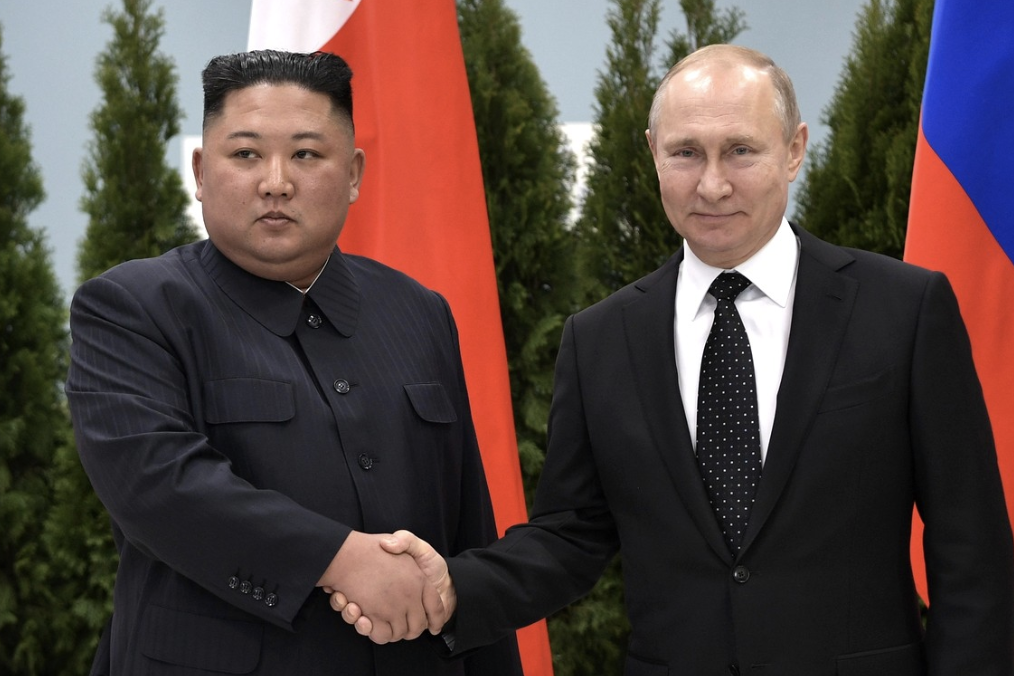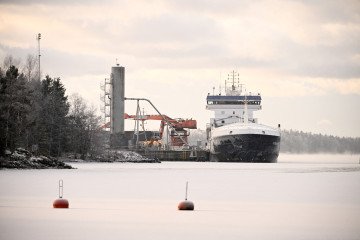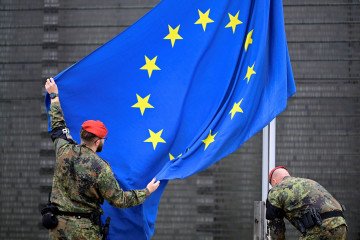While the world’s attention is focused on Iran, we look at Russia’s other strategic partner—North Korea. Exploring the deepening relationship, we see how Russia’s brutal attacks on Ukraine benefit both.
In March of 2024, Russia vetoed the renewal of a UN panel responsible for monitoring sanctions on North Korea’s nuclear weapons and ballistic missiles program. This signaled a deepening relationship between the two authoritarian states and prompted the West to accuse Moscow of doing so to avoid scrutiny. Russia, after all, was violating sanctions itself by using weapons from North Korea to unleash violence across Ukraine.
The UN's Security Council imposed a series of sanctions on Pyongyang since its first nuclear test explosion in 2006—almost 20 years ago. It created a mechanism—a panel of UN experts—to monitor North Korea’s compliance with these sanctions. This year was the first time Russia vetoed the panel, after its 18 years of work and monitoring efforts. It was set to renew at the end of April 2024.
“This is actually a guilty plea,” said Ukraine's Foreign Minister Dmytro Kuleba, “Moscow no longer hides its military cooperation with North Korea in obtaining arms and ammunition in violation of sanctions”.
The United States called the veto a “self-interested effort to bury the panel’s reporting on its own collusion” with North Korea. "This is almost comparable to destroying a CCTV to avoid being caught red-handed," Korean Ambassador Hwang Joon-kook said.
The veto does not remove the current sanctions on North Korea. But it does close the window into Pyongyang, dispelling any further monitoring and investigations into North Korea's expanding nuclear weapons and ballistic missiles program.
“This veto does not demonstrate concern for the North Korean people or the efficacy of sanctions,” said Britain’s UN ambassador Barbara Woodward. “It is about Russia gaining the freedom to evade and breach sanctions in pursuit of weapons to be used against Ukraine.”
An alliance of authoritarian powers
Back in September of 2022, Kim Jong Un made it clear that he is shifting away from the established work of his grandfather and father in normalizing relations with the US and working towards de-nuclearisation. He committed to doing quite the opposite: “We have drawn the line of no retreat regarding our nuclear weapons so that there will be no longer any bargaining over them.” Russia has also become known for its “anti-West” rhetoric.
But there’s more that connects the two than just words. Both Russia and North Korea are authoritarian powers that seek to control their populations to achieve ultimate power. This, along with invasions and rogue nuclear programs, has evidently alienated them from the rest of the world and driven them closer together.
Russia ranks pretty low on the World Freedom Index. In 2023, it received a 13/100 score—firmly securing a spot in the “not free” category. That is because Russia, according to Freedom House, has subservient courts and security forces, controls the media, manipulates elections, and has rampant corruption that facilitates links between state officials and organised crime groups.
North Korea ranks even worse than Russia, with a 3/100 score. The country is a totalitarian dictatorship, regularly engaging in grave human rights abuses. The state maintains a system of camps for political prisoners with torture, forced labor, starvation, and other atrocities used as tools of control.
In April, Jens Stoltenberg, head of NATO, warned of an “alliance of authoritarian powers” which was working more closely together. He told the BBC that Russia, North Korea, Iran, and China were propping each other up. He worryingly explained that the world was now "much more dangerous, much more unpredictable". Stoltenberg also told the BBC that he was working to persuade other countries to commit more money to Ukraine’s war effort, while Russia’s alliance with these countries grows.
But Russia’s and North Korea’s connection goes back further than modern days. North Korea was formed in 1948 with the backing of the then-Soviet Union. Yes, their relationship over the years has been loose. But recently it has blossomed to a dangerous level.
Benefits to both?
There are several ways in which the relationship between Russia and North Korea, as well as the recent veto, are a benefit to both states.
Weapons:
In March of 2024, South Korea’s Defense Minister Shin Wonsik, reported that since last year, North Korea shipped around 7000 containers filled with munitions and military equipment to Russia. The containers, he said, could have been holding about 3 million rounds of 152 mm shells.
Whilst both countries continue to deny any arms deals between them, there have been some clear signs of cooperation. Earlier, in early December of 2023, Russia’s Defense Ministry posted images on social media showing North Korea-made 122mm Grad MLRS rockets.
That same month a Russian telegram channel published a post which read: “Russian marines congratulate “the enemy on the coming new year with the help of 122mm North Korean rockets for the Grad MLRS [multiple launch rocket system]”. The post boasted about Russia’s use of North Korean weapons near Kherson.
Moreover, a UK Defense Intelligence report for UN experts, seen by the Guardian, showed three Russian cargo ships loading containers at North Korean ports between September and December of 2023—before going back to Russian ports. A week later, in January 2024, remnants of ballistic missiles made in North Korea were found in Kharkiv.
The ships within the report were placed under sanctions from the US in 2022, for “their links to the Russian Ministry of Defense’s shipping company, Oboronlogistika OOO, which has been involved in Russia’s illegal seizure and occupation of Crimea since 2014”.
This caused an uproar in the international community. “This and other evidence submitted to the UN sanctions committee should trigger a full investigation into Russia and DPRK’s [North Korea’s] flagrant breaking of international sanctions,” a UN diplomat said.
This uproar was a concern for the Kremlin too and could have served as a potential reason for the recent veto.
And also oil:
Imports of petroleum into North Korea were capped in 2017 by the UN Security Council in response to their nuclear and ballistic weapons program. This is why the claim by South Korea’s Defense Minister Shin that Russia was sending food, oil, and building materials to North Korea in exchange for weapon supplies—was an alarming one.
More proof of his claim came soon. According to an investigation by the Royal United Services Institute, North Korea had received a direct supply of oil products from Russia in March of 2024. In addition, in April of 2024, the South Korean coast guard intercepted an unflagged ship travelling from North Korea to Russia via China, on suspicion of carrying goods prohibited by sanctions.
It seems likely that more oil shipments from Russia to North Korea will come soon. That is why they continue to be of great concern to the Security Council—as they can provide North Korea with larger financial resources for their sanctioned weapons program. It would mean that North Korea would no longer have to rely on costly oil smuggling networks.
What does this mean for Ukraine?
The war in Ukraine may have led to an increase in North Korea's historical paranoia about being invaded by a country with a nuclear arsenal—when it has none itself. This, after all, is exactly what happened to Ukraine—which gave up its nuclear weapons after the dissolution of the Soviet Union. It wouldn’t be surprising if this reinforced North Korea’s drive to further develop its weapons program.
But North Korea has staunchly stood on Russia’s side. In 2022, its leadership stated that they officially recognized “the independence of the People’s Republic of Donetsk and the People’s Republic of Luhansk.” They expressed the will to develop state-to-state relations with “those countries” following “ideas of independence, peace and friendship”
North Korea stands to benefit from Russia’s invasion and war in Ukraine by reaping political, technical, and economic benefits. If Ukraine wins the war, North Korea’s current benefits from its relations with Russia may be halted—or at least weakened. That is why North Korea is likely to harden its current foreign policies and further support Russia.
Russia also benefits from North Korea’s support, because it bolsters Russia’s weapons program. North Korea continues to send Russia ballistic missiles and strengthens Russia’s nuclear threat. When this alliance is set to end, is hard to tell. But one thing is clear: Both regimes continue to further support each other and fuel the war in Ukraine.
-46f6afa2f66d31ff3df8ea1a8f5524ec.jpg)

-27ef304a0bfb28cb4215e5deede4a665.png)

-605be766de04ba3d21b67fb76a76786a.jpg)
-2c683d1619a06f3b17d6ca7dd11ad5a1.jpg)

